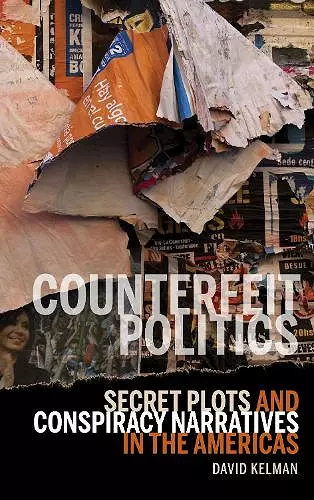Counterfeit Politics
Secret Plots and Conspiracy Narratives in the Americas
Format:Paperback
Publisher:Bucknell University Press
Published:23rd Apr '15
Currently unavailable, and unfortunately no date known when it will be back
This paperback is available in another edition too:
- Hardback£92.00(9781611484144)

In Counterfeit Politics, David Kelman reassesses the political significance of conspiracy theory. Traditionally, political theory has sought to banish the “paranoid style” from the “proper” domain of politics. But if conspiracy theory lies outside the sphere of legitimate politics, why do these narratives continue to haunt political life? Counterfeit Politics accounts for the seemingly ineradicable nature of conspiracy theory by arguing that all political statements ultimately take the form of conspiracy theory. Through careful readings of works by Ernest Hemingway, Ricardo Piglia, Thomas Pynchon, Don DeLillo, Jorge Luis Borges, Ishmael Reed, Jorge Volpi, Rigoberta Menchú, and Ángel Rama, Kelman demonstrates that conspiracy narratives bear witness to an illegitimate or “counterfeit” secret that cannot be fully recognized, understood, and controlled. Even though the secret is not authorized to speak, this “silence” is nevertheless precisely what gives the secret its force. Kelman goes on to suggest that all political statements—even those that do not seem “paranoid”—are constitutively illegitimate or counterfeit, since they always narrate this unresolved play of legitimacy between an official or authorized plot and an unofficial or unauthorized plot (a “complot”). In short, Counterfeit Politics argues that politics only takes place as “conspiracy theory.”
Owing equal parts to deconstruction and to political theory, and situated halfway between US Americanism and Latin Americanism, Counterfeit Politics is a rare book . . . Such a variety of registers will constitute an asset [to readers]. This review is of the opinion that the work is a valuable contribution to hemispheric literary studies. . . .The many merits of the book include, of course, its valiant position at the crossroads of different sub-fields. Kelman takes a stand against the academic market sanctioned practice of disciplinary over-specialization, which often leads to the balkanization of literary archives that belong together. Piglia reading Hemingway, Borges reading English-language detective fiction, or conversely, Borges influencing US postmodernism are all examples of the viability and importance of comparative work. Moreover, Kelman does high theory at a time when many critics have abandoned the ship. For these reasons alone, he is to be commended. * Revista de Estudios Hispánicos *
ISBN: 9781611485875
Dimensions: 226mm x 153mm x 15mm
Weight: 313g
202 pages